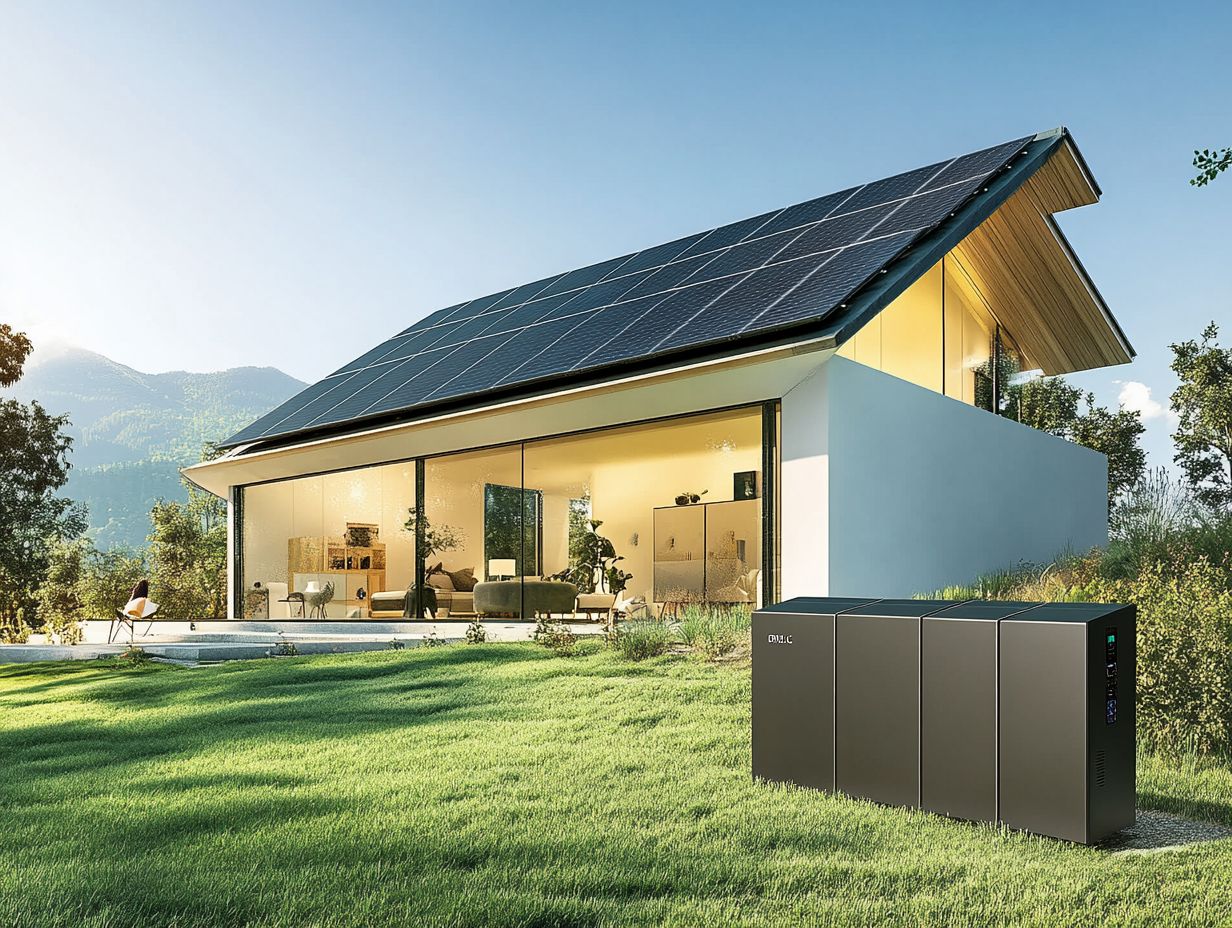“Solar Batteries: Do You Need One for Your Home?”
As the demand for renewable energy continues to rise, solar batteries are becoming essential components of home energy solutions.
But what exactly are solar batteries, and how can they benefit you?
This article explores the advantages of using solar batteries, from reducing energy costs to providing reliable backup power during outages.
You will discover key factors to consider before making a purchase, the different types available, and valuable tips for installation and maintenance.
Dive in to learn how solar batteries can enhance your home s energy efficiency!
Contents
Key Takeaways:

Solar batteries can help reduce energy costs and provide a reliable backup power source during outages.
Before purchasing a solar battery, consider factors like compatibility with your panels, battery capacity, and lifespan for optimal performance.
Different types of solar batteries, such as lead-acid and lithium-ion, each have their own advantages and disadvantages.
Proper installation techniques and regular maintenance are crucial for efficient and long-lasting use of solar batteries.
What are Solar Batteries?
Solar batteries are critical components that allow you to store energy generated from your solar panels. This capability enables you to efficiently harness clean energy and achieve energy independence.
These batteries come in various types, including lithium-ion and lead-acid, each offering unique benefits in terms of energy capacity and lifespan.
As renewable energy becomes more common, understanding the details of solar batteries is essential for maximizing your energy savings and ensuring reliable backup power. They play a vital role in hybrid solar systems and enhance the overall efficiency of grid connections and credit for sending excess energy back to the power grid.
By incorporating solar batteries into your energy system, you can optimize energy usage, capturing surplus power generated on sunny days for use during evenings or cloudy periods. This capability reduces your dependence on the grid and lowers your electricity costs, providing a significant financial advantage.
Battery types vary in efficiency, with lithium-ion often preferred due to their high energy density and longer lifecycle, leading to a more sustainable investment.
Understanding these characteristics helps you make informed decisions that meet your energy needs while contributing to a greener planet.
Benefits of Using Solar Batteries
Using solar batteries offers a variety of benefits, including substantial energy savings and dependable backup power during unexpected outages an increasingly important factor for homeowners today.
These batteries allow you to store excess energy generated by your solar panels, decreasing your reliance on the utility grid and enhancing your energy independence.
You may also discover that these investments qualify for federal tax credits under the Inflation Reduction Act, providing enticing financial incentives for those who want to adopt clean energy solutions.
Reducing Energy Costs
Solar batteries are essential for minimizing your energy costs by storing excess solar energy produced during the day. This stored energy can be used when utility rates peak, allowing you to optimize your savings.
With this setup, you can significantly lower your electricity bills by strategically using stored energy during high-demand periods. When integrated with solar panels, these batteries work seamlessly with the grid, utilizing net metering to offset your energy costs by sending surplus power back when production exceeds consumption.
You also have the opportunity to take advantage of time-of-use rates, where electricity prices fluctuate based on daily demand. By managing when to use your stored solar energy and maximizing production during daylight hours, you can achieve substantial savings on energy expenses, leading to a more sustainable and financially sound energy solution.
Imagine saving money on your energy bills while enjoying reliable backup power!
Start exploring solar battery options today for a smarter, greener home!
Backup Power during Outages
One of the most notable benefits of solar batteries is their remarkable ability to provide backup power during unexpected outages. This ensures that your critical appliances and medical equipment stay operational.
This capability is vital for households that depend on devices like refrigerators, which help maintain food safety. Heating and cooling systems also create comfortable living environments.
For those with specific medical needs, equipment such as breathing machines and oxygen concentrators cannot afford to cease operation.
The reliability of solar batteries ensures that these essential functions continue without interruption. This allows you and your family to feel secure even in uncertain times.
Investing in a powerful solar battery system can transform your energy experience! Not only do you alleviate anxiety associated with grid failures, but you also support sustainability by harnessing clean energy for backup power.
Factors to Consider Before Purchasing a Solar Battery

Before you purchase a solar battery, several key factors deserve your attention. Consider compatibility with your existing solar panels, as well as the battery s capacity and overall lifespan.
Each of these factors is important in determining the battery’s performance and efficiency, ensuring you make a well-informed decision.
Compatibility with Solar Panels
Ensuring compatibility between solar batteries and solar panels is crucial for optimizing energy production. It also facilitates seamless inverter installation. When systems are mismatched, inefficiencies can arise, ultimately reducing your overall energy output.
As you consider a hybrid solar system, it’s essential to understand how the various components interact to maximize efficiency. The inverter is a device that converts the energy from your solar panels into power your home can use.
If your solar batteries and panels are incompatible, the inverter’s performance may suffer. This can lead to power losses and a decline in system reliability. Aligning the specifications and capacities of each component boosts energy generation and fosters a more stable and effective renewable energy solution for your needs.
Battery Capacity and Lifespan
Understanding battery capacity and lifespan is essential when choosing a solar battery. These factors dictate how much energy you can store and how long both lithium-ion and lead-acid batteries will last.
Capacity directly influences the amount of energy you can harness and use during peak demand. This is crucial for maintaining a reliable power supply. Lithium-ion batteries typically provide a higher capacity, allowing you to store more energy in a compact space.
While lead-acid batteries may come at a lower price point, they often require more space and regular maintenance.
Lifespan also plays a critical role in assessing long-term costs. Lithium-ion batteries generally outlast their lead-acid counterparts, meaning you’ll replace them less frequently. Although the upfront investment for lithium-ion technology might be steeper, lower operational costs and enhanced efficiency can lead to significant savings over time.
Types of Solar Batteries
You ll encounter two main types of solar batteries for energy storage: lead-acid batteries and lithium-ion batteries. Each comes with its own set of advantages and disadvantages, catering to your unique needs for efficient battery storage solutions.
Lead-Acid Batteries
Lead-acid batteries stand out as a traditional option for solar energy storage. They re known for their attractive price point, but they come with limited energy capacity and a shorter lifespan compared to lithium-ion batteries.
These batteries operate through a chemical reaction between lead and sulfuric acid, enabling efficient energy discharge and recharge cycles. Their affordability can be quite appealing, but regular maintenance is essential. You’ll need to check water levels and perform equalization charging to extend their lifespan effectively.
The initial investment may be lower than that of lithium-ion alternatives. However, the longevity and efficiency of lithium-ion batteries could outweigh ongoing maintenance costs in the long run. Lead-acid batteries also lose energy capacity more rapidly under heavy usage.
So, it s crucial to carefully assess your energy needs and evaluate which battery type aligns best with your requirements.
Lithium-Ion Batteries

Lithium-ion batteries have positioned themselves as the go-to option for contemporary solar energy systems, thanks to their impressive longevity. They offer superior energy capacity and exceptional performance. Investing in these batteries is a smart choice you can’t afford to miss!
These batteries not only provide remarkable cycle life and efficiency but also minimize energy losses. They are essential elements in fostering a sustainable future. Their sleek, compact designs facilitate seamless integration into various spaces, enhancing usability for both homeowners and businesses.
While the initial investment might appear significant, lithium-ion batteries demonstrate cost-effectiveness over time. They can significantly lessen your dependence on grid power, which translates to lower energy bills.
Technology is advancing rapidly, which will increase the role of lithium-ion batteries in enhancing energy efficiency and reliability within solar systems. This paves the way for greater adoption and innovation.
Installation and Maintenance of Solar Batteries
The proper installation and maintenance of solar batteries are essential for maximizing both their efficiency and lifespan. This involves key steps, including the meticulous installation of inverters and conducting regular system checks to ensure your battery bank remains reliable and performs at its best.
Proper Installation Techniques
Proper installation techniques are essential for ensuring your solar batteries operate at peak efficiency. Pay special attention to the inverter installation and the configuration of the battery bank to maximize energy efficiency.
Start by thoroughly assessing your electrical system to ensure compatibility between the solar batteries and the chosen inverter. This connection is crucial; the inverter acts as the bridge, converting the DC power stored in your batteries into usable AC power. Misconfiguration here can lead to performance issues, such as inefficient charging or system overload.
It s vital to meticulously plan your battery bank layout, allowing for adequate ventilation and enough space to prevent overheating. Common pitfalls include incorrect wiring setups and overlooking the total capacity required, which can spell disaster for your system.
By dedicating time to follow these steps, you greatly enhance both the longevity and performance of your solar energy system.
Maintenance Tips and Tricks
Regular maintenance of solar batteries is essential for sustaining their capacity and maximizing longevity. Simple and effective practices can significantly enhance their performance over time.
To ensure optimal functioning, consistently monitor battery health through periodic checks of voltage levels and temperature. This vigilance can alert you to potential issues before they spiral out of control.
Keeping the battery terminals clean is another important step; it prevents corrosion that can hinder performance. Additionally, keeping connections tight helps energy flow smoothly.
By adopting a routine that incorporates these maintenance habits, you not only extend the life of your batteries but also improve energy efficiency. This leads to a more reliable and sustainable power source for your solar setup.
Frequently Asked Questions
What is a solar battery?

A solar battery stores energy from solar panels.
Do I need a solar battery for my home?
It depends on your energy needs. Solar batteries provide backup power and reduce grid reliance, but they aren t necessary for every home.
What are the benefits of having a solar battery?
Having a solar battery can provide backup power during blackouts, increase energy independence, and potentially save money on energy bills by storing excess energy for later use.
How does a solar battery work?
Solar batteries work by storing excess energy from solar panels during peak production times, such as during the day, and then releasing that energy during times of lower production, such as at night.
What size solar battery do I need for my home?
Your solar battery size depends on how much energy you use and your goals.
Consulting a professional can help you find the right size for your needs.
How much does a solar battery cost?
Solar battery costs vary based on size and brand.
Typically, prices range from $5,000 to $15,000.
Don’t forget to think about the long-term savings on your energy bills!






